
Thai art refers to a diverse range of art forms created in Thailand from prehistoric times to the present day, including architecture, sculpture, painting, textiles, decorative arts, crafts, ceramics, and more. While Buddhism has played a significant role in Thai art, with many sculptures and paintings depicting Buddha images and religious themes, nature, including flora and fauna, as well as mythical creatures, has been a major inspiration for Thai art, with colorful motifs appearing in various types of art forms. In contemporary Thai art, traditional works remain significant and continue to influence artists' concepts.
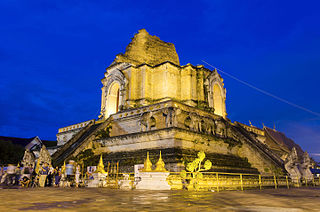
Wat Chedi Luang is a Buddhist temple in the historic centre of Chiang Mai, Thailand. The current temple grounds were originally made up of three temples — Wat Chedi Luang, Wat Ho Tham and Wat Sukmin.

Lampang, also called Nakhon Lampang to differentiate from Lampang province, is the third largest city in northern Thailand and capital of Lampang province and the Mueang Lampang district. Traditional names for Lampang include Wiang Lakon and Khelang Nakhon. The city is a trading and transportation center. Lampang lies 601 km (373 mi) north of Bangkok and 101 km (63 mi) southeast of Chiang Mai.

Wat Phra Kaew is a third-common-class royal temple situated in the area of 10,640 square metres on Trairat road, Wiang sub-district, Muang Chiang Rai in Chiang Rai City, Thailand. The King of Thailand upgraded the temple to the royal temple on May 31, 1978. The temple gains historical importance as the place where the Emerald Buddha was found. It is also one of the main centres of Buddhist education and the Sangha's administration in northern Thailand.

Haw Phra Kaew, also written as Ho Prakeo, Hor Pha Keo and other similar spellings, is a former temple in Vientiane, Laos. It is situated on Setthathirath Road, to the southeast of Wat Si Saket. It was first built in 1565 to house the Emerald Buddha, but has been rebuilt several times. The interior now houses a museum of religious art and a small shop.

The city of Nan's most famous wat is renowned for its cruciform ubosot which was constructed in 1596 and restored during the reign of Phra Chao Anantaworarittidej (1867-1875).
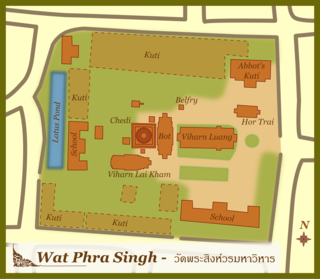
Wat Phra Singh is a Buddhist temple in Chiang Mai, northern Thailand. King Ananda Mahidol, bestowed upon it the status of Royal temple of the first grade in 1935.
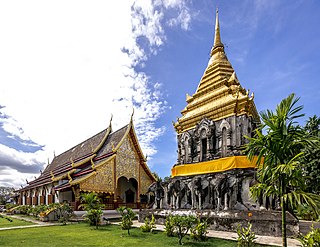
Wat Chiang Man is a Buddhist temple inside the old city of Chiang Mai, in northern Thailand.

Wat Lok Moli is a Buddhist temple in Chiang Mai, northern Thailand. The temple is situated on the north side of the north moat surrounding the old part of the city, about 400 meters west of the Chang Phuak city gate.
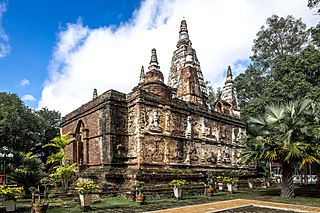
Wat Chet Yot or officially called Wat Photharam Maha Wihan is a Buddhist temple (Wat) in Chiang Mai in northern Thailand. It is a centre of pilgrimage for those born in the year of the Snake.
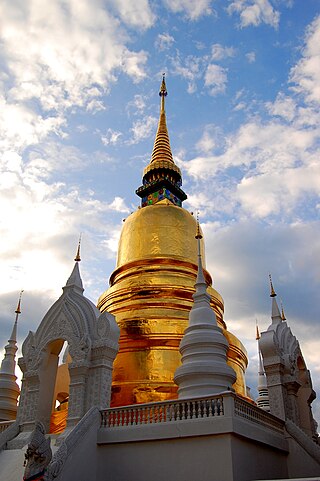
Wat Suan Dok, also known as Wat Buppharam is a Buddhist temple (Wat) in Chiang Mai, northern Thailand. It is a Royal Temple of the Third Class. The temple is on Suthep Road, approximately one kilometre west of Suan Dok gate at the west side of the moat.
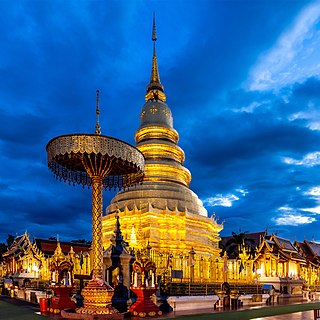
Wat Phra That Hariphunchai is a Buddhist temple (wat) in Lamphun, Thailand. The temple's origins date from the 11th century but the central stupa is thought to originate in the 9th century.

Wat Buppharam is a Buddhist temple in Chiang Mai, Thailand. Founded in 1497 by King Mueang Kaeo, the temple was where Kawila began a ritual circumambulation of Chiang Mai to reoccupy it after two centuries of Burmese rule. Most of the temple buildings date to the late 1800s. The temple is also known for its Burmese-style chedi, which was rebuilt in 1958, and a Lanna-style ordination hall made from teak and glass inlay mosaic, built in 1819.

Wat Chiang Yuen is a Buddhist temple in Chiang Mai, Thailand, located north of the Old City, about 600 metres (2,000 ft) east of Wat Lok Moli. First built in 1500s, Lanna kings historically paid homage to the Phra Suppunyu Chao Buddha image at the temple before their coronation. The temple was abandoned during Burmese rule, and was reconstructed in 1794 by King Kawila. The temple is known for its large chedi, which has a whitewashed square base guarded by Burmese chinthe on each corner, an octagonal middle section dotted with porcelain flowers, and a five-tiered hti crowning the stupa. The Lanna-style sala is buttressed by two elaborately decorated poles called tagundaing, each topped by a hamsa.

Chiang Saen is an old city in Northern Thailand. Chiang Saen is the capital of the Chiang Saen district, which lies in the north of the Chiang Rai province.

Wat Mahawan is a Buddhist temple in Chiang Mai, Thailand. It is located on the eastern periphery of the old city of Chiang Mai in Thaphae Road.

Wat Phan Tao is a Buddhist temple in Chiang Mai, northern Thailand. It is situated on Prapokklao Road, Mueang Chiang Mai district, in the centre of the old city.

Wat Prasat is a Buddhist temple in Chiang Mai, northern Thailand. It is situated on Inthawarorot Road in the old city.

Wat Phuak Hong is a Buddhist temple in Chiang Mai, northern Thailand. It is situated on Samlarn Road in the old city.

Wat Umong Maha Thera Chan is a Buddhist temple in Chiang Mai, northern Thailand. It is situated on Ratchapakhinai Road in the centre of the old city.






















